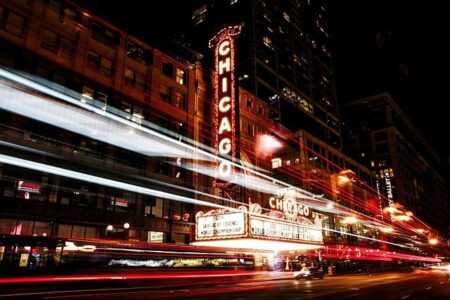University of Chicago’s Curated Reading List: Illuminating Today’s Political Landscape
The University of Chicago has unveiled a meticulously selected compilation of readings aimed at enriching public comprehension of the intricate political surroundings that defines our era. Named “Chicago Perspectives on Current Events,” this anthology features thought-provoking contributions from the university’s scholars and affiliated commentators. It offers balanced, in-depth examinations and a spectrum of viewpoints on urgent political matters. Amid escalating polarization in political discourse, this collection serves as a beacon of scholarly clarity, helping readers decode and engage with the forces shaping contemporary politics.
Local Perspectives with National Impact: Chicago’s Political Insights
Chicago’s vibrant political scene provides a distinctive vantage point for understanding national developments, merging the city’s diverse local experiences with wider policy discussions. Known for its legacy of grassroots activism and influential political leaders, Chicago offers rich commentary on the multifaceted challenges confronting the nation. Academics, journalists, and public thinkers rooted in the city analyze topics such as immigration reform, economic disparities, urban governance, and criminal justice, grounding their insights in both empirical research and lived experience.
Engaging with Chicago-based authors and institutions reveals how local governance intricacies reflect and influence national policy trends. Their work highlights the ripple effects of federal decisions on communities, especially those historically marginalized. Key thematic areas to explore include:
- Urban Development and Economic Equity: Investigating the impact of national programs on Chicago’s underserved neighborhoods.
- Immigration and Population Dynamics: Personal stories that humanize broader immigration debates.
- Political Innovation and Civic Participation: Chicago’s experiments in democratic reform and community engagement.
- Public Health and Social Services: The intersection of federal health policies with local challenges.
| Contributor | Area of Expertise | Notable Work |
|---|---|---|
| Chicago Council on Global Affairs | International Relations & Security | “America in an Interconnected World” Report |
| Metropolitan Planning Council | Urban Planning & Social Justice | “Revitalizing Chicago’s Communities” Series |
| UChicago Harris School of Public Policy | Policy Research & Political Economy | “Policy Insights” Journal |
| Chicago Reporter | Investigative Journalism & Equity | “Race, Economy, and Politics in Chicago” Features |
Understanding Polarization: Essential Readings for Bridging Divides
In today’s climate of deepening ideological divides and fragmented media landscapes, grasping the roots and consequences of polarization is crucial for informed citizenship. The University of Chicago’s curated selection offers a multidisciplinary approach-spanning political science, psychology, and media studies-to unravel the causes behind societal rifts and propose avenues for meaningful dialog.
Highlighted works include:
- The Righteous Mind by Jonathan Haidt – exploring how moral psychology can bridge ideological chasms.
- Democracy in Chains by Nancy MacLean – tracing historical undercurrents fueling partisan conflict.
- Network Propaganda by Yochai Benkler and colleagues – dissecting media ecosystems’ role in amplifying polarization.
- How Democracies Die by Steven Levitsky and Daniel Ziblatt – analyzing threats to democratic institutions amid political strife.
| Book Title | Author(s) | Subject Focus |
|---|---|---|
| The Righteous Mind | Jonathan Haidt | Moral Foundations and Political Psychology |
| Democracy in Chains | Nancy MacLean | Historical Political Economy |
| Network Propaganda | Yochai Benkler et al. | Media Influence and Political Polarization |
| How Democracies Die | Steven Levitsky & Daniel Ziblatt | Democratic Stability and Threats |
Chicago’s Economic Evolution and Social Movements: Books That Illuminate Broader Trends
Chicago’s economic history serves as a microcosm for understanding sweeping social changes across the United States. This reading list spotlights influential works that examine how industrial shifts, labor activism, and migration have shaped the city’s character and, by extension, national developments. Such as, The New Deal and the Triumph of Liberalism offers a complete look at how federal policies transformed Chicago’s economic landscape during the mid-20th century. Similarly, Steel and Streetcars explores the interplay between industrial growth and urban working-class life, reflecting broader labor struggles nationwide.
Beyond economic factors, several titles delve into the intersections of race, class, and urban policy, positioning Chicago as a focal point for racial tensions and progressive activism. Divided Metropolis investigates the spatial segregation that shaped postwar Chicago, while City on the Edge chronicles grassroots efforts to confront these divides. The table below summarizes key themes from these seminal works, illustrating Chicago’s role in national socio-economic transformations:
| Title | Main Focus | Contribution to Understanding |
|---|---|---|
| The New Deal and the Triumph of Liberalism | Impact of federal policies on Chicago’s economy | Connects local labor reforms to national recovery efforts |
| Steel and Streetcars | Industrialization and working-class urban life | Highlights labor movements shaping American cities |
| Divided Metropolis | Racial segregation and urban policy | Examines systemic barriers to equity in urban areas |
| City on the Edge | Grassroots activism in Chicago | Documents local responses to social and racial divides |
- Insight: These texts frame Chicago as a microcosm reflecting national and global economic and social shifts.
- Importance: Understanding these dynamics enriches discussions on current political strategies and community resilience.
Empowering Civic Engagement: Resources for Active Participation and Thoughtful Dialogue
Access to trustworthy civic resources is vital for individuals seeking to engage meaningfully in political conversations and community initiatives. Chicago’s rich cultural diversity and political heritage create a fertile environment for active citizenship. The University of Chicago supports this engagement by offering analytical tools and curated reading materials that help citizens decode complex policy debates and connect with grassroots movements.
To foster informed dialogue and community involvement, residents are encouraged to utilize a variety of platforms, including local think tanks, academic publications, and public forums. These resources promote evidence-based discussions that go beyond surface-level opinions. Consider the following avenues to amplify your civic participation:
- Local Research Centers: In-depth reports and seminars on urban policy and socio-economic challenges.
- Community Engagement Platforms: Neighborhood meetings and digital forums designed for collaborative problem-solving.
- Academic Publications: Scholarly essays and thematic reading lists curated by experts.
- Historical and Multimedia Archives: Video documentaries and interviews that contextualize Chicago’s political evolution.
| Resource Type | Example | Format |
|---|---|---|
| Think Tank | Chicago Policy Review | Research Reports, Webinars |
| Community Forum | Neighborhood Voices Network | Town Halls, Online Discussions |
| University Publication | UChicago Public Policy Series | Essays, Curated Reading Lists |
| Multimedia Archive | Chicago History Channel | Documentaries, Interviews |
Conclusion: Cultivating Informed Citizenship Through Scholarly Engagement
As political realities continue to shift rapidly, the University of Chicago’s thoughtfully curated reading list stands as a vital resource, offering a range of perspectives that deepen our grasp of current affairs. Engaging with these carefully chosen works equips readers to better understand the complexities of today’s political environment and to participate in informed, constructive conversations. In a time characterized by swift change and intense debate, such intellectual tools are indispensable for nurturing a knowledgeable and proactive citizenry.





